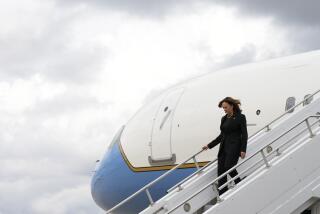State Department Staff Feels Anguish, Betrayal : Election: The agency, which has shunned politics, is tarnished by the search of Clinton’s passport records, the acting secretary says.
- Share via
WASHINGTON — In the long white halls of the State Department, the talk on Wednesday was of anguish and anger, and the stinging hurt of a proud institution that feels itself betrayed.
“Our reputation has been tarnished,” Acting Secretary of State Lawrence S. Eagleburger said somberly, his usual ebullience erased. “We have no business being engaged in this kind of activity, and I am sorry it happened . . . . The damage done to the governor, if there has been any, I apologize for it. More fundamentally, I apologize for the department being in this mess.”
Cabinet officials do not often apologize for their departments’ failings. Nor do they offer their resignations for the misdeeds of their subordinates--as Eagleburger disclosed that he did last month.
But in the special culture of the State Department, the late-night search of Bill Clinton’s passport files burned as a scandal unlike other Washington scandals. The professional foreign service, an unabashedly elitist institution, has always considered itself above the kind of political chicanery that happens elsewhere.
Moreover, the passport affair was felt by many diplomats as a painful blow to Eagleburger, a widely popular figure in the foreign service. The acting secretary, who rose from the ranks, had hoped to finish his State Department career--he plans to retire in January--on a more dignified note.
“Poor Larry,” said one of his aides, wincing.
Traditionally, the State Department stays out of political campaigns entirely--a reflection of the long-held goal of a bipartisan foreign policy.
Senior officials in domestic agencies are expected to campaign for their President’s reelection. The secretary of state and his aides are expected to stay on the sidelines.
But this year, the lines were blurred, in part because Secretary of State James A. Baker III left the building in August to run President Bush’s reelection campaign as White House chief of staff. And he took four of his top lieutenants with him--putting campaign strategy in the hands of aides who had, only a few weeks before, been powerful figures at State.
At the same time, veteran foreign-service officers say, the department’s ranks have been swelled with more political appointees than ever.
Unlike foreign-service officers--who join the department only after a process of rigorous examination and expect to serve Republican and Democratic administrations--political appointees often win their State Department jobs as rewards for campaign work.
“There’s no question: There’s been a growing feeling that the place is permeated with political appointees,” said George S. Vest, a former director general of the foreign service.
“We’ve always had a certain number of political appointees at the level of assistant secretary. But the real difference came with the (Ronald) Reagan Administration. They said every assistant secretary is going to have a political appointee as a deputy . . . (and) that enlarged the number of political appointees.”
The search of Clinton’s passport files was ordered by one such political appointee, Elizabeth M. Tamposi, who had been a GOP fund-raiser in New Hampshire. Tamposi said she believed that she was acting at the behest of another political appointee, Janet G. Mullins, a Baker aide at the White House who went to State after working on the 1988 Bush campaign. (Mullins denied any direct role, though circumstantial evidence suggests that she knew the search was being made.)
Eagleburger loyally defended the principle of political appointees Wednesday.
“There is absolutely nothing wrong in Mr. Bush or Mr. Clinton or anybody else putting political appointees into this department that will carry out his policies and that are familiar with and sympathetic to the directions in which he wants to go.
“The issue is not whether you should have political appointees; the issue is the kind of people you appoint,” he said.
But when he was asked whether Baker’s move to the White House had created an atmosphere that obscured the line between permissible and impermissible actions, he was uncharacteristically at a loss.
“I have no answer to that question,” he said. “I don’t know.”
More to Read
Get the L.A. Times Politics newsletter
Deeply reported insights into legislation, politics and policy from Sacramento, Washington and beyond. In your inbox twice per week.
You may occasionally receive promotional content from the Los Angeles Times.











